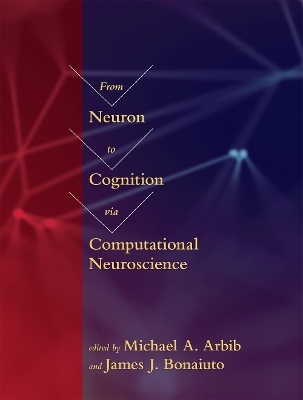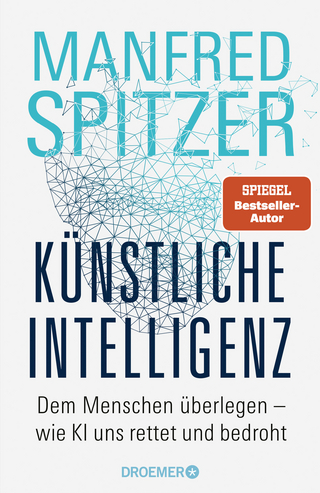
From Neuron to Cognition via Computational Neuroscience
MIT Press (Verlag)
978-0-262-03496-8 (ISBN)
This textbook presents a wide range of subjects in neuroscience from a computational perspective. It offers a comprehensive, integrated introduction to core topics, using computational tools to trace a path from neurons and circuits to behavior and cognition. Moreover, the chapters show how computational neuroscience-methods for modeling the causal interactions underlying neural systems-complements empirical research in advancing the understanding of brain and behavior.
The chapters-all by leaders in the field, and carefully integrated by the editors-cover such subjects as action and motor control; neuroplasticity, neuromodulation, and reinforcement learning; vision; and language-the core of human cognition.
The book can be used for advanced undergraduate or graduate level courses. It presents all necessary background in neuroscience beyond basic facts about neurons and synapses and general ideas about the structure and function of the human brain. Students should be familiar with differential equations and probability theory, and be able to pick up the basics of programming in MATLAB and/or Python. Slides, exercises, and other ancillary materials are freely available online, and many of the models described in the chapters are documented in the brain operation database, BODB (which is also described in a book chapter).
Contributors
Michael A. Arbib, Joseph Ayers, James Bednar, Andrej Bicanski, James J. Bonaiuto, Nicolas Brunel, Jean-Marie Cabelguen, Carmen Canavier, Angelo Cangelosi, Richard P. Cooper, Carlos R. Cortes, Nathaniel Daw, Paul Dean, Peter Ford Dominey, Pierre Enel, Jean-Marc Fellous, Stefano Fusi, Wulfram Gerstner, Frank Grasso, Jacqueline A. Griego, Ziad M. Hafed, Michael E. Hasselmo, Auke Ijspeert, Stephanie Jones, Daniel Kersten, Jeremie Knuesel, Owen Lewis, William W. Lytton, Tomaso Poggio, John Porrill, Tony J. Prescott, John Rinzel, Edmund Rolls, Jonathan Rubin, Nicolas Schweighofer, Mohamed A. Sherif, Malle A. Tagamets, Paul F. M. J. Verschure, Nathan Vierling-Claasen, Xiao-Jing Wang, Christopher Williams, Ransom Winder, Alan L. Yuille
Michael Arbib has played a leading role at the interface of neuroscience and computer science ever since his first book, Brains, Machines, and Mathematics.From Neuron to Cognition provides a worthy pedagogical sequel to his widely acclaimed Handbook of Brain Theory and Neural Networks. After thirty years at University of Southern California he is now pursuing interests in "how the brain got language" and "neuroscience for architecture" in San Diego. James J. Bonaiuto is a Postdoctoral Researcher at the Sobell Department of Motor Neuroscience and Movement Disorders at University College London. John Rinzel is Professor of Neural Science and Mathematics at the Center for Neural Science, New York University. James J. Bonaiuto is a Postdoctoral Researcher at the Sobell Department of Motor Neuroscience and Movement Disorders at University College London. Michael Arbib has played a leading role at the interface of neuroscience and computer science ever since his first book, Brains, Machines, and Mathematics.From Neuron to Cognition provides a worthy pedagogical sequel to his widely acclaimed Handbook of Brain Theory and Neural Networks. After thirty years at University of Southern California he is now pursuing interests in "how the brain got language" and "neuroscience for architecture" in San Diego. Michael E. Hasselmo is Professor of Psychology and Director of the Computational Neurophysiology Laboratory at Boston University, where he is also a faculty member in the Center for Memory and Brain and the Program in Neuroscience and principal investigator on grants from the National Institute of Mental Health and the Office of Naval Research. Auke Jan Ijspeert is SNF Assistant Professor and Head of the Biologically Inspired Robotics Group in the School of Computer and Communication Sciences at the Swiss Federal Institute of Technology, Lausanne. Alan Yuille is Professor in the Department of Statistics, University of California, Los Angeles. Joseph Ayers is Director of the Marine Science Center and Associate Professor of Biology at Northeastern University. Tomaso A. Poggio is Eugene McDermott Professor in the Department of Brain and Cognitive Sciences at MIT, where he is also Director of the Center for Brains, Minds, and Machines and Codirector of the Center for Biological and Computational Learning. He is coeditor of Perceptual Learning (MIT Press). Angelo Cangelosi is Professor of Artificial Intelligence and Cognition at the Centre for Robotics and Neural Systems at the University of Plymouth, U.K.
| Erscheinungsdatum | 13.12.2016 |
|---|---|
| Reihe/Serie | Computational Neuroscience Series |
| Co-Autor | Nicolas Brunel, John Rinzel, Jonathan Rubin |
| Zusatzinfo | 351 color illus.; 702 Illustrations, unspecified |
| Verlagsort | Cambridge, Mass. |
| Sprache | englisch |
| Maße | 216 x 279 mm |
| Themenwelt | Informatik ► Theorie / Studium ► Künstliche Intelligenz / Robotik |
| Naturwissenschaften ► Biologie ► Humanbiologie | |
| Naturwissenschaften ► Biologie ► Zoologie | |
| ISBN-10 | 0-262-03496-4 / 0262034964 |
| ISBN-13 | 978-0-262-03496-8 / 9780262034968 |
| Zustand | Neuware |
| Haben Sie eine Frage zum Produkt? |
aus dem Bereich


